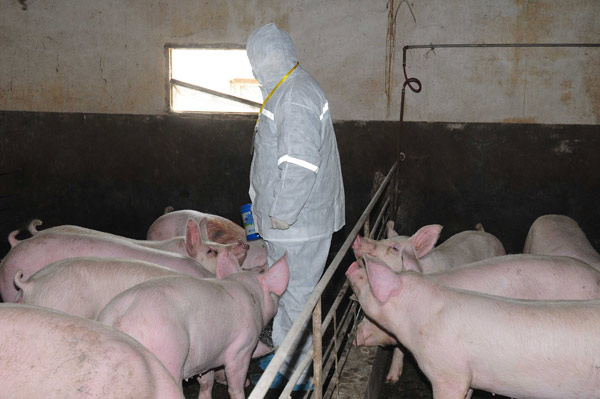Probe finds 12 officials involved in meat scandal
|
|
|
An animal health professional enters a pigpen in Nanyang, Henan province, on March 24 to get urine samples to test for clenbuterol.[China Daily] |
An initial investigation has found that 12 government officials were implicated in a scandal involving tarnished meat products, while another 41 are still being probed.
In an announcement on Monday, the Henan provincial government said law enforcement officers have captured two major suspects and shut down their plants, after they tested 310,000 pigs across the province and confirmed that 134 of them tested positive for clenbuterol, a toxic chemical added to the animal's feed.
The 12 officials have been delivered to judicial departments for further investigation, the government said.
The scandal, dating back to March 15 when China Central Television reported Jiyuan Shuanghui Food Co Ltd, a supplier of the country's largest meat processor -- Henan-based Shuanghui company -- had purchased pigs fed with the illegal additive.
The report said the massive flow of tarnished meat into the market was partially due to local quarantine officials who allow pig farmers to choose the test samples by themselves.
Clenbuterol, which is also known as "lean meat powder", can accelerate muscle-building resulting in leaner pork.
An earlier raid put 14 farm managers and brokers in custody and at least 27 local officials were fired or suspended, the local government said.
However, Liu Mancang, vice-governor of the province, said the scandal has caused disastrous effects and the government will introduce tighter measures to completely secure food safety.
In response to public panic, a total of nine ministry-level government agencies, including the Ministry of Agriculture and the Ministry of Health, will launch a year-long campaign to eliminate the use of clenbuterol in pigs, said Xinhua News Agency on Monday.
Meanwhile, other provinces and regions also stepped up efforts to quarantine illegal additives in meat.
In Beijing, stricter spot checks targeting all live pigs from Henan province and fresh pork products began two days after the scandal, said Li Bo, a staff member at the capital's animal health inspection institute.
In some cities, including Xi'an, customers were called on to return tarnished meat products to the store.
Yang He, a 27-year-old resident in Beijing, said on Monday that she had thrown away all Shuanghui's products in her refrigerator when she heard the news. She said she won't buy products from the company anymore.
In the five days after the scandal was exposed, more than 2,000 tons of meat products and 70 tons of fresh meat had been recalled, said the company.
Shuanghui Investment and Development's shares fell by 10 percent on the day the scandal was exposed before its trading was suspended the following day.
Wan Long, board chairman of the group, told xinmin.cn on Monday that the company's sales had shrunk by more than 1 billion yuan ($150 million) in 10 days since the scandal, adding the brand image had been seriously damaged.
But he insisted that the affected meat was only an isolated case and that his company would not become "the second Sanlu".
In 2008, the notorious Sanlu's baby formula tainted with melamine and industrial chemicals killed at least six infants and caused kidney problems for more than 300,000 babies. The company was eventually forced to shut down.
In Guangzhou, Guangdong province, in 2009, 70 cases of clenbuterol poisoning were reported.
Experts hailed the tougher penalties in the food safety industry.
"As far as I know, it's the first time that the government has punished its officials so extensively for a food safety case," said Sang Liwei, a food safety lawyer in Beijing and a representative of the Global Food Safety Forum, a non-government organization.
According to the new amendment on the criminal law issued last month, suspects who use illegal food additives that have severe or fatal consequences will face a maximum penalty of the death sentence, said Sang.
 0
0 








Go to Forum >>0 Comments